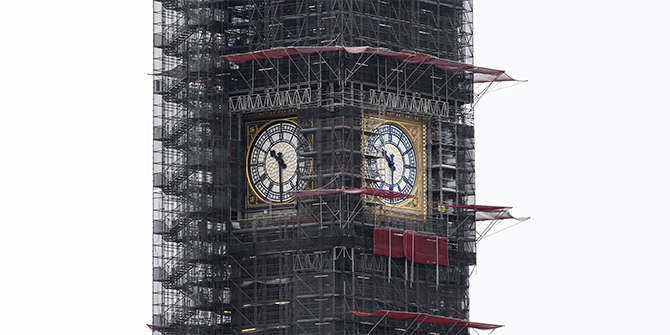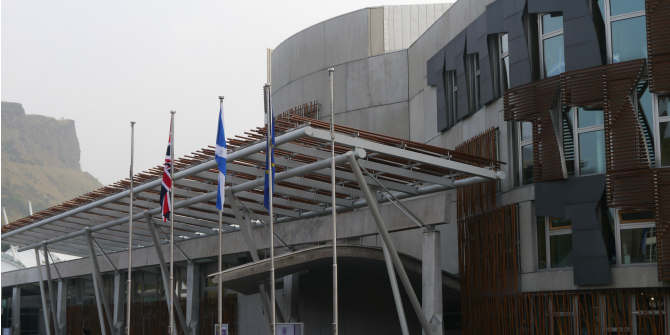Paul Anderson and Johanna Schnabel explain why recent proposals to reform UK intergovernmental relationships are a welcome development. They nevertheless warn that reformed structures alone will do little to change the lack of trust between the UK and devolved governments if not accompanied by a corresponding shift in attitude towards more constructive engagement.
Intergovernmental relations in the UK have been long derided as weak, underdeveloped, and ineffective by various parliamentary committees and researchers. It is laudable, therefore, to finally see some clear strategic thinking in the shape of a newly proposed ‘Prime Minister and Heads of Devolved Governments Council’ and other interministerial structures. These reforms present an opportunity to formalise and forge more stable and closer intergovernmental relationships. This will, however, be no easy task in the shadow of Brexit-induced constitutional tensions and the ongoing politics of COVID-19. Notwithstanding progress in reforming intergovernmental apparatus, harmonious relations are unlikely to be the order of the day.
The ‘Prime Minister and Heads of Devolved Governments Council’ is at the apex of a three-tier system that replaces the largely ineffective Joint Ministerial Committee system. The Council is tasked with providing strategic direction and oversees the entire system of intergovernmental relations. The middle tier consists of an Interministerial Standing Committee and a Finance: Interministerial Committee to discuss funding issues. The former will oversee the work of the third-tier councils. It will consider cross-sectoral issues and wider strategic international matters. Finally, Interministerial Groups will work on policy-specific issues in areas of both devolved and reserved matters. Together, these committees are expected to enable governments to address a broad range of current issues such as COVID-19 recovery, climate change, and inequalities in a mutually cooperative spirit.
The new structures are a far cry from the under-institutionalised, informal, and infrequent experience of the Joint Ministerial Committee system, creating a sense of optimism about the possibility of a new era of cooperation. This is further bolstered by the renewed commitment to forging working relationships based on mutual trust and respect and the creation of a standing secretariat to manage the administrative burden involved in organising intergovernmental meetings (a source of significant tension in the earlier system). The Council will hold annual meetings, but the two Committees and the Interministerial Groups are expected to meet much more frequently, sometimes even on a monthly basis. Importantly, decisions will be made by consensus, an important reform with the potential to further create a sense of joint and equal partnership between the four governments. Further, a new and improved dispute resolution mechanism has been agreed upon, addressing previous criticisms whereby the UK government served as both judge and jury in addressing disputes. In contrast to the previous system, the new arrangements are more institutionalised, more formalised, seek to encourage closer interaction, as well as foster a sense of joint and even equal partnership between the four nations.
The key question therefore is, will the new structures actually work? Currently, different political parties are in power in Westminster, Cardiff Bay, Holyrood, and Stormont, each with different and at times competing ideological positions and constitutional visions. This does not necessarily preclude effective intergovernmental relations. Yet, as the experience in other countries proves, intergovernmental relations require political willingness to function. In Spain, for example, despite the existence of intergovernmental forums, relations between the pro-unity Spanish and pro-independence Catalan governments have been increasingly conflictual and at times non-existent due to diametrically opposing constitutional visions
A common critique of intergovernmental relations in the UK has been that they serve as forums for knowledge exchange rather than allowing the devolved governments to influence UK government policy. The new structures hint at a heightened role for the voices of the devolved governments. Whether these are simply heard or actively listened to, however, remains to be seen. Hitherto, the Scottish, Welsh, and Northern Irish Governments have already highlighted concerns. For Scottish Deputy First Minister John Swinney, for instance, the new structures are more style over substance. The conflictual relations we have witnessed during Brexit have clearly left their mark.
That the Prime Minister and the Treasury preside over the Council and the Finance: Interministerial Committee respectively, underlines these concerns. It is not surprising that the UK government wants to keep its hand on the new arrangements. The experience of countries like Australia, Canada, and Spain shows, however, that it is a bad idea – one that undermines the message of collaboration and cooperation the UK government is seemingly trying to convey. In these countries, councils tend to be used to advance the central government’s agenda rather than generating a true spirit of cooperation. Assigning the role of the chair of the top-tier body to the Prime Minister makes intergovernmental relations too dependent on the political will of the central government, at the expense of the devolved governments, and reinforces the hierarchical nature of devolution. This weakness in the UK’s new structures could have been avoided by learning from the experience of other devolved countries. In Germany and Switzerland, where such hierarchical arrangements do not exist, intergovernmental relations are more harmonious. There are, nonetheless, other notable positives. The establishment of an independent secretariat made up of civil servants nominated by the four governments, though based in the Cabinet Office, is a welcome reform, as is the decision to have rotating chairs in the Interministerial Groups.
It has been more than twenty years since the establishment of devolved governments and legislatures in Scotland, Wales, and Northern Ireland. To finally see serious concern afforded to intergovernmental relations is a welcome and noteworthy development. Since the vote to leave the EU in 2016, managing the UK’s territorial governance has been a difficult task. But as the conduct of the governments proved in the early phase of the COVID-19 pandemic, effective intergovernmental interaction is possible. Reformed structures, however, will do little to change the lack of trust between the UK and devolved governments if not accompanied by a corresponding shift in attitude and culture towards more constructive engagement. Much of the onus here is on the UK government to alter its predominantly unitary and hierarchical mindset, but the devolved governments must play their part too. In times of ongoing and enhanced constitutional turbulence, intergovernmental relations will continue to feel the strain, but the proposed reforms are a step in the right direction.
___________________
Paul Anderson is Senior Lecturer in International Relations and Politics at Liverpool John Moores University.
Johanna Schnabel is Lecturer in Politics at Freie Universität Berlin.
Photo by James Giddins on Unsplash.







